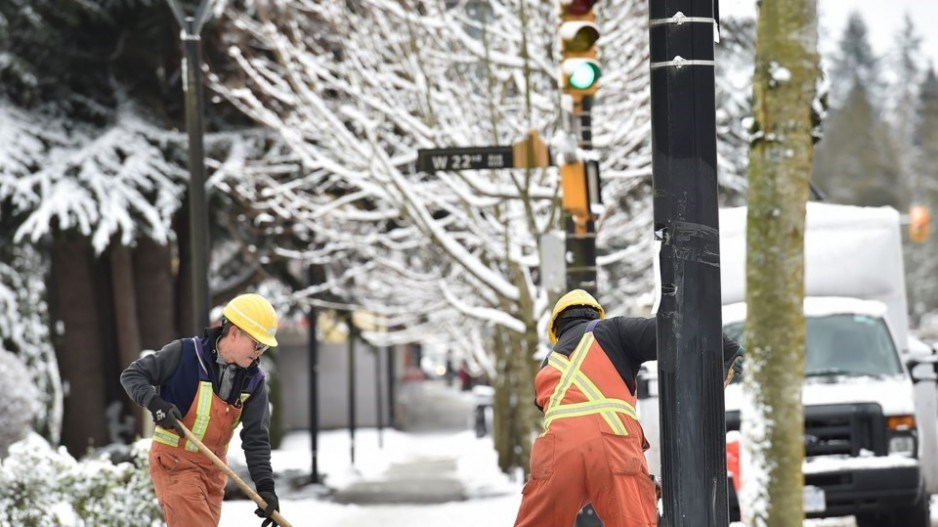Few events challenge Metro Vancouverites as much as a snowstorm.
Residents of all municipalities get a chance to gauge the performance of both residents and governments, as the airwaves – locally and nationally – are filled with images of stuck public transit vehicles and overeager drivers unable to control their cars.
In November and December 2022, the daily lives of Metro Vancouverites were altered after two separate snowstorms affected how we could go from place to place. Social media became a repository of complaints over the perceived failure of municipalities to be ready. It was, in a way, the first major test of new municipal governments in Vancouver and Surrey.
Research Co. and Glacier Media asked Metro Vancouverites about their personal experience with the snowstorms over the last two months of 2022. The results do not leave people or elected officials in a particularly good light.
It is dejecting to see more than half of Metro Vancouverites (54 per cent) reporting that their neighbours did not bother to shovel the snow on their sidewalks as required. Surrey came out on top as the municipality where the highest proportion of residents (59 per cent) seemingly chose not to exercise their civic duty.
It is also against the law to travel in a vehicle from which the snow has not been fully removed. This did not stop some drivers from doing as they pleased, as outlined by the 50 per cent of Metro Vancouverites who saw a vehicle with snow on its top circulating in their municipality.
The absence of snow tires, or experience in icy conditions, also compelled Metro Vancouverites to take evasive action. More than half of Metro Vancouver drivers (54 per cent) chose not to operate their own vehicle on account of the snowstorms. For three in 10 residents (30 per cent), the snowstorms meant avoiding the commute and working from home – a proportion that rises to 35 per cent among women.
Governments can be happy with the success of their communications efforts, but the expectations of many residents were not adequately met. Most Metro Vancouverites (51 per cent) are satisfied with the way their municipalities managed the timeliness of alerts during the snowstorms. Other aspects were not ranked as favourably. We find majorities of residents expressing dissatisfaction with snow clearing on sidewalks (58 per cent) and snow clearing on roads (57 per cent).
Along with the immediate impact of the snowstorm, interruptions to basic services were also reported. More than three in five Metro Vancouverites say that the collection of organic or “green” waste (66 per cent), non-organic garbage (63 per cent) and recyclable materials (also 63 per cent) ceased at least once during the months of November and December.
It is clear that residents of one municipality were more likely to experience disruption. About two in five residents of Vancouver say the collection of non-organic waste (40 per cent), organic waste (42 per cent) and recyclable materials (43 per cent) was interrupted more than once in the last two months of 2022. In Surrey, fewer than a quarter of residents report repeated stoppages to any of these services.
Across Metro Vancouver, 61 per cent of residents believe their municipality was unprepared for the snowstorms. There is a considerable gender gap on this assessment, as 69 per cent of women appear dissatisfied with the way their municipal government readied itself for the snowstorms, compared to 53 per cent of men.
The two most populous municipalities in Metro Vancouver, each with new mayors in charge, have plenty of challenges ahead – especially on issues such as public safety and transportation. Still, dismay from constituents can linger when basic services are not provided as expected.
Long-serving mayors usually benefit from previous experience in dealing with weather and appeasing the public. It will be interesting to see how rookie administrations perform when the next snowstorm arrives, and whether the public becomes more or less accepting of any commotion that ensues. The really troubling issue arising is the high proportion of residents who witnessed snow on sidewalks and improperly cleared vehicles on roads.
Mario Canseco is president of Research Co.
Results are based on an online study conducted on Jan. 14-16, 2023, among 700 adults in Metro Vancouver. The data has been statistically weighted according to Canadian census figures for age, gender and region in Metro Vancouver. The margin of error – which measures sample variability – is plus or minus 3.7 percentage points, 19 times out of 20.



